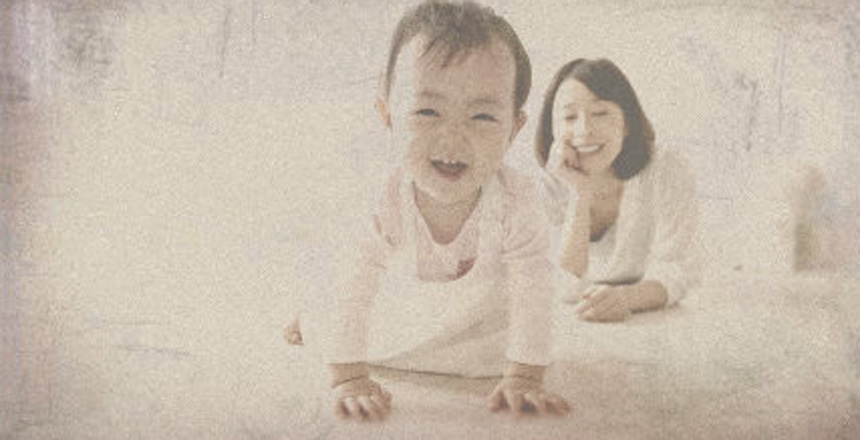Becoming a parent when you’ve lost one of your own can be one of the most difficult experiences you’ll endure. But there are also surprising ways in which it can be incredibly healing.
During the last few months of my first pregnancy I cried every day, dreading the arrival of my daughter. It wasn’t just that I felt utterly unprepared for what I was getting myself into but also that I was deftly afraid of entering motherhood without my own mother in the picture.
I was 18 when she died; seven years later I lost my father. For a long time it was hard for me to imagine having a family again, but when I met my husband I knew in this strange, primal way that I would have children with him. It was easier than I anticipated and at 31 I found myself swiftly thrust into motherhood.
Related
In those last days and weeks before I became a parent I thought obsessively about my own mother. Although she’d been gone for more than a decade, I suddenly missed her more fiercely than I had in years. It had been hard to do things like graduate college and get married without her to witness those milestones, but becoming a mother myself was an entirely different experience. As my belly continued to swell and the days grew closer to my due date, I could feel myself digging in my heels, afraid of how I would get through it.
Thus, I was utterly unprepared when those first few days and weeks with my daughter were wholly different than I’d imagined. Instead of missing my mother, I felt closer to her than ever before.
It had been twelve years since my mother’s death. In that time I felt as though I’d picked through every last memory of her, wearing them thin like clothing washed too many times. But cradling my tiny daughter I felt as though I was experiencing a whole new side of my mother. So this is what my she did with me. This is how she held me, kissed me, whispered in my ear. This is how much she loved me.
My oldest daughter is four now. If I’m going to be honest, I must admit that it got harder. Throughout these four years of parenthood I have felt newly reconnected to my own, but I’ve also grieved for them all over again. Not a day goes by when I don’t wish they were here to see my beautiful girls growing up, to be here to offer me tips and guidance, babysitting, and send grandparent care packages.
Watching my husband and friends have the exact experience I crave has only deepened my sorrow at times. But I’ve found many ways to bolster my loss, and bring my own parents into the picture in any way I can.
Here are a few tips to think about when approaching parenthood without your own mother or father there to support you.
• Expect to have new feelings of grief, or even more complicated thoughts and memories regarding your own childhood. Becoming a parent can remind you of how much your own parents loved you, but it can also serve to remind you that they’re gone. Do your best to ensure you have someone in your life (a partner, therapist or friend) to share these feelings with. Keeping them in will only make them fester…and we all know nothing good comes of that.
• It’s totally normal to find yourself resentful of your friends who have doting parents rushing into to lend support to their new grandchildren. Unsurprisingly, it’s not necessarily helpful to share this with that friend or let it get in the way of your friendship. Having someone you trust to process this with is key. Hope Edelman’s book “Motherless Mothers” is a great source of commiseration and insight. Alison Gilbert’s “Parentless Parents” is another good resource that’s also helpful for fathers.
• Just because your parent isn’t in the picture it doesn’t mean they can’t be part of your family’s life. Make sure your children know they have two sets of grandparents – those who are still here to send holiday sweaters and make cookies – and those who are only here in memory. Hang photos of your parents in the house and frequently share memories of them with your kids. You’ll be surprised by how much they learn about them.
• Make space in your life for the feelings that will arise by writing about them. Write letters to your children that they can read when they’re older. Or write a letter to your deceased parent, telling them about your new experiences – the good, the bad and the ugly.
• Not having your own mother or father there to offer guidance can be really challenging; especially at 4:32 am when your baby just can’t seem to stop crying. Create a support network of people who can be part of your life as you transition into parenthood. Reach out to loved ones who can offer support, knowledge, and nurturing as you enter this new world.
• Parenthood is rough, even on the most stable couple. Expect that you may get a little crazy under all the stress and that the person you’re liable to take it out on first will be your partner. This is normal. Try to address the real root of your feelings, rather than just bitching about who emptied the Diaper Genie last.
• Feelings of sadness during the first year of your child’s life are totally normal. Parenthood isn’t always the dreamy picture it’s painted to be, and your grief may exacerbate this. Again, find that someone to talk to who understands these feelings (and if it can be done during pregnancy, the better prepared you’ll be).
• Just because your parent isn’t here to reinstate your own childhood rituals doesn’t mean you can’t do it. Cook your parent’s favorite meals, read your old favorite childhood books to your kid, and sing the silliest songs you remember sharing as a kid. It will be bittersweet, but incredibly meaningful to both you and your new family.
Claire Bidwell Smith is a therapist specializing in grief and author of the memoir “The Rules of Inheritance.” She lives in Los Angeles with her family.












